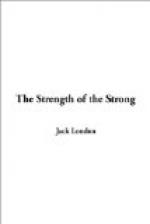Once the plague broke through and seized upon the German and Austrian soldiers who were guarding the borders of Turkestan. Preparations had been made for such a happening, and though sixty thousand soldiers of Europe were carried off, the international corps of physicians isolated the contagion and dammed it back. It was during this struggle that it was suggested that a new plague-germ had originated, that in some way or other a sort of hybridization between plague-germs had taken place, producing a new and frightfully virulent germ. First suspected by Vomberg, who became infected with it and died, it was later isolated and studied by Stevens, Hazenfelt, Norman, and Landers.
Such was the unparalleled invasion of China. For that billion of people there was no hope. Pent in their vast and festering charnel-house, all organization and cohesion lost, they could do naught but die. They could not escape. As they were flung back from their land frontiers, so were they flung back from the sea. Seventy-five thousand vessels patrolled the coasts. By day their smoking funnels dimmed the sea-rim, and by night their flashing searchlights ploughed the dark and harrowed it for the tiniest escaping junk. The attempts of the immense fleets of junks were pitiful. Not one ever got by the guarding sea-hounds. Modern war-machinery held back the disorganized mass of China, while the plagues did the work.
But old War was made a thing of laughter. Naught remained to him but patrol duty. China had laughed at war, and war she was getting, but it was ultra-modern war, twentieth century war, the war of the scientist and the laboratory, the war of Jacobus Laningdale. Hundred-ton guns were toys compared with the micro-organic projectiles hurled from the laboratories, the messengers of death, the destroying angels that stalked through the empire of a billion souls.
During all the summer and fall of 1976 China was an inferno. There was no eluding the microscopic projectiles that sought out the remotest hiding-places. The hundreds of millions of dead remained unburied and the germs multiplied themselves, and, toward the last, millions died daily of starvation. Besides, starvation weakened the victims and destroyed their natural defences against the plagues. Cannibalism, murder, and madness reigned. And so perished China.
Not until the following February, in the coldest weather, were the first expeditions made. These expeditions were small, composed of scientists and bodies of troops; but they entered China from every side. In spite of the most elaborate precautions against infection, numbers of soldiers and a few of the physicians were stricken. But the exploration went bravely on. They found China devastated, a howling wilderness through which wandered bands of wild dogs and desperate bandits who had survived. All survivors were put to death wherever found. And then began the great task, the sanitation of China. Five years




